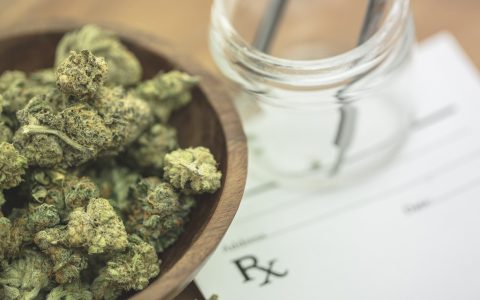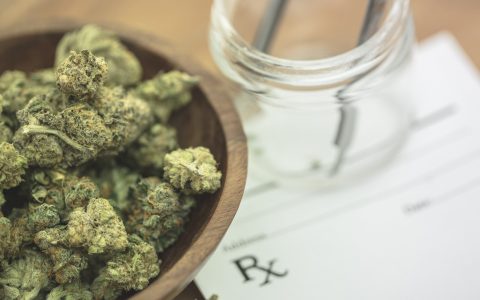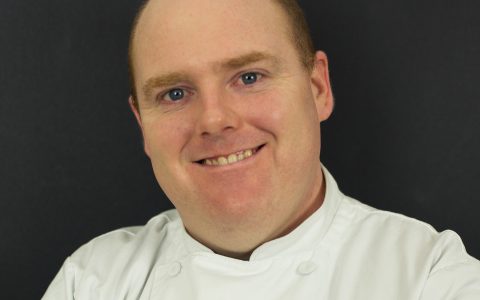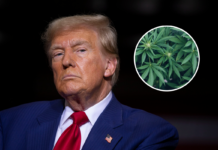After being deployed to Afghanistan and Haiti, military combat engineer Fabian Henry was beset by anxiety and rage. By the time he returned to his home in Oromocto, New Brunswick, he was taking pharmaceutical drugs to treat symptoms of PTSD. But he continued to struggle with his demons.
Henry, who did six tours of duty during 13 years of military service, once threatened to kill a local fire official and was arrested for drunk driving. His marriage collapsed and he had limited access to his kids. He even tried to choke a rescue dog.
Henry finally found relief through medical cannabis and brought his life out of a tailspin, but he remained concerned about the health and well-being of his fellow veterans. “A couple of my friends killed themselves. One of them stabbed himself with a steak knife,” he told Leafly. “Another one turned to cocaine.”
Convinced that Veterans Affairs was doing very little to help suffering veterans, Henry took matters into his own hands. Now, seven years later, he is making a difference in the lives of fellow veterans and is garnering a lot of attention for his efforts.
In fact, he is going to be featured in a documentary about Canadian veterans who use cannabis as medicine. The documentary, produced by an American company, starts filming this weekend.
Marijuana for Trauma
In 2013, Henry and fellow military veteran Mike Southwell founded the Oromocto-based company Marijuana for Trauma, to help connect veterans with doctors who prescribe cannabis and to educate veterans about the treatment.
Fabian Henry
After completing a reverse takeover with licensed producer Abba Medix in 2016, Henry donated his ownership to a charity for veterans called the Global Alliance Foundation Fund.
“I donated 100% of my ownership of the company I created so I could look my fellow veterans in the face and they know I’m trying to do something good for them and not just trying to make money,” he recently told the Truro News.
Henry also acquired shares in a new company called Canada House.
Marijuana for Trauma is now known as Canada House Clinics, which is a chain of medical cannabis clinics across Canada, with more than 8,000 registered patients. It is a subsidiary of the publicly traded Canada House Wellness Group Inc. It profits from fees paid to it by cannabis producers.
Retreats
Meanwhile, the Global Alliance Foundation Fund subsidizes Veterans for Healing, a non-profit organization that Henry co-founded in 2014 with the aim of helping veterans recover from trauma.
In the last few years, the organization has purchased four parcels of land in Nova Scotia, including three in Cape Breton, where it plans to build retreats for veterans going through their final phase of recovery.
Henry explains that the first phase of recovery involves getting cannabis or another medication and the second involves getting continuing care from a doctor. The third phase is maintenance.
At these retreats, which cover 253 hectares (625 acres) in total, veterans, especially those suffering from PTSD, will receive help in making the transition from service to civilian life. They will have the opportunity to participate in various activities including horseback riding, gardening, yoga, and meditation.
Breton CannaPharms
Henry’s initiatives don’t end there. He recently became the founder and director of Breton CannaPharms Ltd., which has applied to Health Canada to become a licensed cannabis producer on Cape Breton Island. Work is now underway to build a production facility that could grow about 12,500 kilograms of cannabis a year.
Henry anticipates getting a cultivation license next year and plans to produce cannabis for both medical and recreational use. But he said the focus will be on the medical side—on developing and producing strains that are most effective in treating PTSD and other ailments common among veterans.
This is especially important now, he says, because the legalization of recreational cannabis has led to some supply shortages. He also said that cannabis producers have shifted their attention to the recreational market.
When asked why he has devoted so much time and energy to helping veterans heal, Henry is unequivocal. “Look, the people at Veterans Affairs don’t give a f**k. No one is going to take care of us so we have to take care of ourselves,” he told Leafly. “Look out world, we are changing things!”














